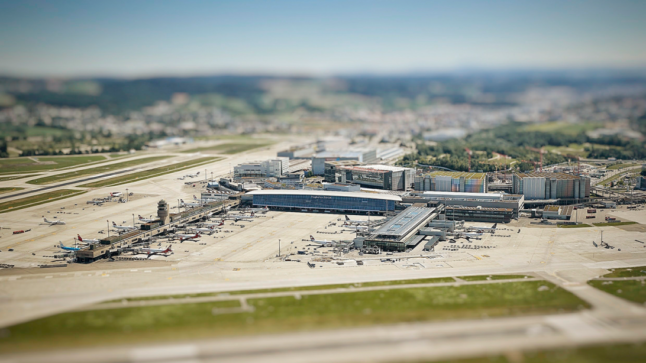Survey reveals 10 best employers in Switzerland
Recruiting company Randstad has compiled the ranking of the most attractive employers in Switzerland, based on a survey which asked respondents where they would like to work.
They could choose from among 150 companies.
Job security was the most important factor in choosing an employer, followed by the working environment and pay.
These are the top 10 winners:
- Zurich airport
- Patek Philippe
- Lindt & Sprüngli
- Rolex
- Swiss International Airlines
- Swiss Federal Railways
- SUVA
- Banque Pictet & Cie
- Swiss Re
- Jet Aviation

Photo by Zurich Airport
Fribourg or Freiburg? The answer may be lost in translation
French remains the only official language in Fribourg, but there’s an ongoing debate about making the canton bilingual. This is especially relevant since the city of Fribourg is planning to merge with eight neighboring bilingual communities.
However, it seems that there is no legal basis for including German as the second official language, even though the canton’s website is in both languages..
Some suggest that in municipalities with a significant linguistic minority, both French and German should be the official languages, but it is unclear how large the linguistic minority must be in order for bilingualism to be allowed.
A committee made up of French speakers opposes what it calls “the Germanization of Fribourg”, arguing that “no canton can become bilingual with a magic wand”.
The two camps may settle for the “pragmatic bilingualism” compromise, meaning that French would remain the only official language, but German speakers will be able to communicate with cantonal and municipal administration in their mother tongue.
New app aims to make international travel easier
On Thursday, SWISS airline started testing the application on the Zurich to London Heathrow flights.
The goal of this simple mobile application, launched by the International Air Transport Association (IATA), is to “make travel as easy as possible during a pandemic”.
The app informs passengers of different measures and requirements in force in the destination country, including testing and quarantine requirements. It also shows where the nearest test locations are.
Still in the testing phase, Travel Pass is currently only available by invitation, but IATA said it would be accessible more widely in the coming weeks.
SWISS is to become the first airline in the Lufthansa Group to trial @IATA's new Travel Pass app on its ZRH-LHR route from 22 April onwards. The trial marks a major further step in making travel simple and reliable again during the current pandemic: https://t.co/7ypeUKnNal pic.twitter.com/x03u3SjeyO
— Swiss Intl Air Lines (@FlySWISS) April 14, 2021
READ MORE: EXPLAINED: Can people from the United States and Great Britain come to Switzerland?
French bricks in a Swiss town cause uproar among residents
Work on the Museum of Natural History is underway in La Chaux-de-Fonds, in canton Neuchâtel. The museum will house “100,000 objects, classified in the Swiss inventory of cultural property of national and regional importance”, according to the local news platform, Arcinfo.
However, residents in this town became outraged when they noticed trucks with French license plates on the construction site. It turns out that bricks from France are used to build the museum, angering the townspeople who believe that “local materials should be favoured, especially for a public establishment financed by taxpayers”, Arcinfo reported.
Théo Bregnard, the municipal councilor in charge of museums, said it is difficult to monitor where all the building materials come from, while others claim there are not enough quarries in Switzerland to supply enough bricks for such a large construction.
If you have any questions about life in Switzerland, ideas for articles or news tips for The Local, please get in touch with us at [email protected]



 Please whitelist us to continue reading.
Please whitelist us to continue reading.
Member comments